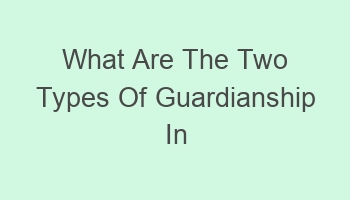What Are The Two Types Of Guardianship In Illinois?

Guardianship in Illinois consists of two main types: guardianship of the person and guardianship of the estate. Guardianship of the person involves making decisions about healthcare, education, and daily living for an individual. Guardianship of the estate pertains to managing the finances and assets of the individual. In Illinois, these two types of guardianship are appointed by the court to protect the well-being and interests of minors or incapacitated adults. Understanding the differences between guardianship of the person and guardianship of the estate is crucial for individuals seeking to fulfill these roles in Illinois. It is essential to navigate the legal requirements and responsibilities associated with each type of guardianship to ensure proper care and protection for those in need.
Contents
| Guardianship of the person and estate are the two types in Illinois. |
| Person guardianship involves making personal and medical decisions. |
| Estate guardianship involves managing finances and property. |
| Court appoints guardians based on the individual’s needs. |
| Guardians must act in the best interests of the individual. |
- Legal process for guardianship in Illinois requires court approval.
- Guardians may be family members or appointed professionals.
- Annual reports are required for both types of guardianship.
- Termination of guardianship can occur if no longer needed.
- Court review is necessary for major decisions in guardianship.
Why Are Guardianships Important in Illinois?
Guardianships are essential legal arrangements in Illinois that allow individuals to make decisions for someone who is unable to do so themselves, typically due to age or incapacity.
- Guardianships ensure that the well-being and interests of vulnerable individuals are protected.
- They provide a mechanism for managing the financial and personal affairs of individuals who cannot do so independently.
What Are The Two Types of Guardianship in Illinois?
In Illinois, there are two primary types of guardianship: guardianship of the person and guardianship of the estate.
- Guardianship of the person involves making decisions about the individual’s living arrangements, healthcare, and day-to-day needs.
- Guardianship of the estate pertains to managing the individual’s financial assets and property.
When Is Guardianship of the Person Appropriate?
Guardianship of the person is typically necessary when an individual is incapable of making informed decisions about their healthcare, living situation, or personal needs.
| It may be required for individuals with cognitive impairments such as dementia or developmental disabilities. | It can also be necessary for minors who are orphans or whose parents are incapacitated. |
How Does Guardianship of the Estate Protect Financial Interests?
Guardianship of the estate is crucial for safeguarding the financial assets and property of individuals who are unable to manage their finances independently.
- The guardian must manage and protect the individual’s assets, ensuring they are used for the individual’s benefit.
- They are responsible for making financial decisions on behalf of the individual and must account for their actions to the court.
Who Can Serve as a Guardian in Illinois?
In Illinois, guardians can be family members, friends, or professional individuals appointed by the court to act on behalf of the incapacitated individual.
| It is essential for guardians to be trustworthy, capable, and committed to acting in the best interests of the individual. | The court will consider the relationship between the proposed guardian and the individual when making a decision. |
What Steps Are Involved in Establishing Guardianship in Illinois?
The process of establishing guardianship in Illinois typically involves filing a petition with the court, providing notice to interested parties, and attending a hearing to determine the need for guardianship.
- The court will appoint a guardian ad litem to investigate the circumstances and make recommendations to the court.
- The court will make a decision based on the best interests of the individual in need of guardianship.
How Can Guardianship Be Terminated in Illinois?
Guardianship in Illinois can be terminated if the individual is no longer incapacitated or if there is a change in circumstances that renders guardianship unnecessary.
| The court may also terminate guardianship if the guardian is found to be neglectful or abusive in their duties. | Interested parties can petition the court to modify or terminate the guardianship arrangement. |
Can Guardianship Orders Be Challenged in Illinois?
Guardianship orders in Illinois can be challenged if there is evidence of misconduct, fraud, or abuse on the part of the guardian.
- Interested parties can file a petition with the court to contest the guardianship order.
- The court will review the evidence and make a determination based on the best interests of the individual under guardianship.